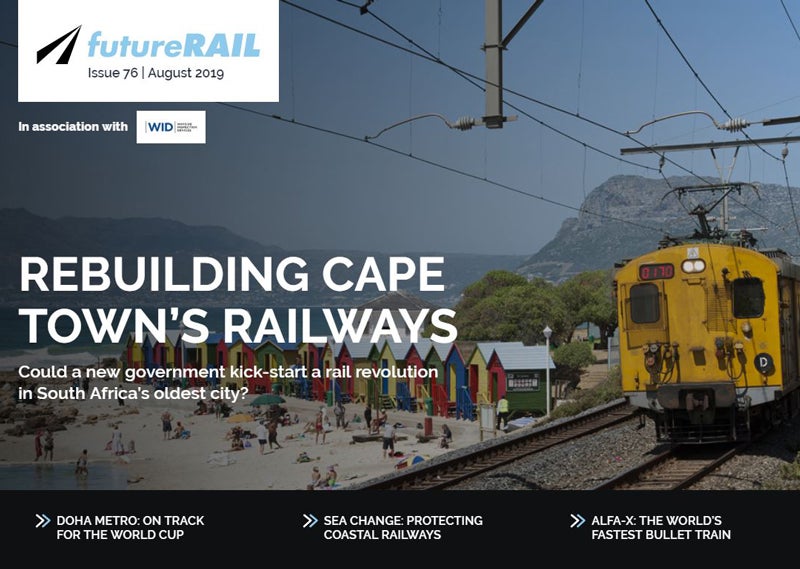
Future Rail is back for another issue packed with technology news and industry analysis. In this issue, we find out what could be done to revitalise Cape Town’s flagging rail network, explore the impact of climate change on the UK’s coastal railways, and analyse a new airline-style ticketing approach from Virgin Trains.
Whether you are on a desktop, tablet or smartphone, you can read the magazine for free online.
In this issue
Tunnel vision: does HS2’s Y-shaped plan really work for the North?
The current proposal for HS2 sees it fork into a ‘Y’ shape at Birmingham, with one strand running to Manchester and the other to Leeds, but consultancy Expedition Engineering proposes an alternative solution that incorporates a trans-Pennine tunnel. Julian Turner talks to director Alistair Lenczner.
Read the article here.
Big moves: Swiss Railways’ infrastructure upgrades
The Swiss Federal Office of Transport recently published its annual progress report for railway infrastructure development projects. From the ambitious New Rail Link through the Alps to the four-metre corridor, Adele Berti looks at the projects and the progress they’ve made over the past year.
Read the article here.
How well do you really know your competitors?
Access the most comprehensive Company Profiles on the market, powered by GlobalData. Save hours of research. Gain competitive edge.

Thank you!
Your download email will arrive shortly
Not ready to buy yet? Download a free sample
We are confident about the unique quality of our Company Profiles. However, we want you to make the most beneficial decision for your business, so we offer a free sample that you can download by submitting the below form
By GlobalDataSea change: protecting coastal railways from rising sea levels
In 2014, the devastating impacts of climate change almost proved fatal for the railway line running in the English town of Dawlish, which was partially destroyed by extreme weather conditions. Adele Berti asks how Network Rail is protecting its coastal railways from high waves and predicted rising sea levels.
Read the article here.
Doha Metro: on track for the next World Cup
In May, Qatar Rail announced the soft launch of its brand new Doha Metro project ahead of schedule and with a good safety record in construction, according to the operator. Patrick Kingsland profiles the project and explore how it fits into Qatar’s wider rail plans ahead of the 2022 World Cup.
Read the article here.
Cape Town: will the city ever rebuild its railway?
For many years, railways in Cape Town, South Africa, have been beset by issues including rising crime rates and unreliable services. Adele Berti explores the reasons why the network is struggling, and asks if the newly re-elected ANC government could bring about much-needed changes.
Read the article here.
In pictures: Glasgow Subway shows off its new driverless trains
In May, Stadler Rail delivered the first of 17 new trains to the Glasgow Subway, equipped for driverless operations. Chris Lo takes a visual tour of the new rolling stock, and the wider modernisation of this historic metro system.
Take a look at our gallery here.
Five questions for Alfa-X: the world’s fastest bullet train
Japan recently unveiled its next-generation bullet train Alfa-X, which will run at a maximum speed of 240mph once in operation in 2030. As tests kick off, Adele Berti answers the five questions that the industry will be asking about the train.
Read the article here.
Planes, trains and flawed reasoning: Virgin’s airline-style ticketing proposal
Virgin Trains recently proposed reforming the UK rail industry through the introduction of airline-style, reservation-only ticketing on long-distance services. This could lead to less standing on trains, but deep down smacks of impracticality, writes Ross Davies.
Read the article here.
Next issue preview
From 8 July, Transport for London (TfL) began tracking passengers across the entire London Underground metro network using Wi-Fi signals. Will privacy concerns surrounding the scheme outweigh its potential benefits? We find out in the next issue of Future Rail.
Also in this issue, we explore the impact of rail freight on small businesses in the US after a new industry report highlighted upcoming regulatory proposals that could reduce competition and hinder innovation. And, after a bizarre case in Russia whereby an entire disused railway bridge was stolen, we take a closer look at the issue of metal theft on the railways.
With the EU Agency for Railways assuming responsibility for vehicle authorisation and safety in Europe, we trace the saga of the Single EU Railway project in a timeline feature. Then it’s time to take a step into the virtual realm, as we find out about the lengths that game developers go to create hyper-realistic railway simulators.
Also in this issue, we ask if a new adaptable train carriage solution from UK-based 42 Technology could revolutionise train interiors and if the relatively new concept of ‘Very Light Rail’ could become more prominent in the future. To round things up, we take a tour of some of the most beautiful and historically important funicular railways around the world.



